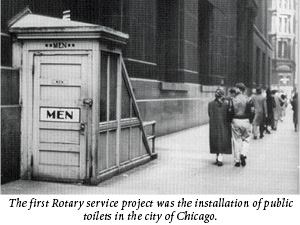Chicago Public Toilets Service Project
Service: The motives behind motivation
Excerpted from the September 2016 issue of The Rotarian, click link to see full story.
You may be surprised to learn that in 1905, when Rotary began, it was not based on the idea of Service Above Self. Instead, the two main aims of the Chicago club were “the promotion of the business interests of its members” and “good fellowship and other desiderata ordinarily incident to Social Clubs.”
But for Paul Harris, that wasn’t enough. He wanted a club that would get involved in civic affairs and benefit the community.
A prospective member, Chicago attorney Donald Carter, had been “struck by the selfish character of the organization,” according to Harris biographer Fred A. Carvin. The two conspired to introduce a Third Object of Rotary: “the advancement of the best interests of Chicago.” As Harris later remembered, “I concluded that the most practical method of introducing community service would be to find a worthy cause and then induce members to work for it.”
The club began by buying a horse for a farmer whose animal had died. Members also provided a newsboy with a suit of warm clothes. All along, Harris was planning bigger things, creating a committee to find civic projects for Rotary to participate in. The first issue it addressed was the lack of public restrooms downtown. There was only one choice at the time – a saloon. Once there, it was said, men could be tempted to take a drink or two. As for women, entering such an establishment was simply out of the question.
So Harris and his committee persuaded the Chicago City Council to fund public facilities for men and women to the tune of $20,000 (almost $500,000 today) in taxpayer money. And Chicago Rotarians got so much satisfaction out of seeing their work get results that “Service Above Self” became an operating principle, although it didn’t become one of our official mottoes until 1950.
In Rotary, it never has been easy to get every member – or sometimes even most members – involved in community projects. Many people join because they want to give back to society, and community service is what Rotarians often say makes their membership worthwhile.
